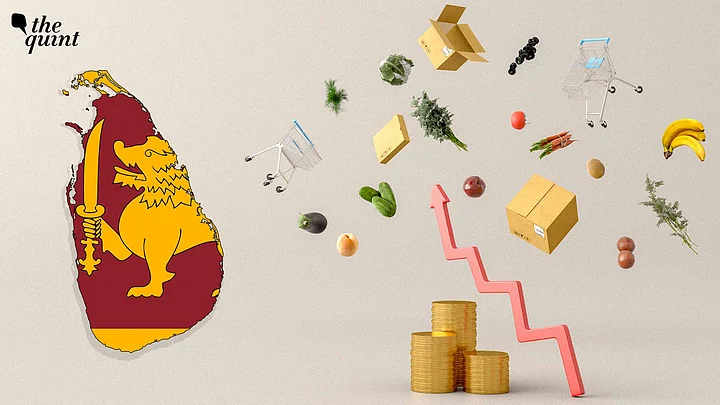Yet another IPCC report is out that warns of dire consequences if the world doesn’t course-correct and pursue a low-carbon pathway. This means drastically cutting our dependence on fossil fuels, among a string of other hard-hitting measures. One country did try that by announcing a ban on chemical-based farming and its decision to go organic. But now, the world media is blaming it for an unprecedented economic crisis.
Yes, it is true that Sri Lanka is facing a massive shortage in essential goods and services and a plummeting economy. But to blame chemical-free farming for a food crisis not only shows a simplistic understanding of the concept itself, but also reinforces a narrative long promoted by the fossil fuel industry.
For too long, the fossil fuel industry has promoted the message that food can be grown at a mass scale only by pumping it with chemical fertilisers, weedicides and pesticides, and that there will be a large-scale food crisis if these inputs are stopped.
The New York Times carried a piece headlined “Sri Lanka’s plunge into organic farming brings disaster”, while an Indian news channel ran a headline saying “Organic farming to blame for Sri Lanka’s agrarian crisis”. Congress MP Shashi Tharoor recently said on Twitter, “I am all in favour of healthy organics, but shouldn’t we be aware of how Sri Lanka’s shift to organic farming in 2019 proved disastrous for food security?”
Don't Dismiss Organic Farming as a Failure
Such narratives largely ignore the perils of chemical-based agricultural practices, such as the steep costs for a country like Sri Lanka in terms of the import of chemical fertilisers, the impact on the environment due to the receding groundwater table, the health impact on farmers who handle the chemicals on a daily basis, among other concerning effects.
Moreover, organic farming no longer means just the absence of chemical spray; it means growing a multitude of crops so that in case one of them fails, the farmer has a back-up. While the soil is replenished, the health benefits of organic farming go not just to the consumer but also to the farmer, who isn’t exposed to carcinogenic chemicals daily. These benefits go unreported while weighing the pros and cons of organic farming.
So, before organic farming is dismissed as a failure, what must be asked is were the thousands of farmers in Sri Lanka prepared for this transition? Were the necessary supply and demand chains created so that the market was ready for it? Chemical-free farming requires access to bio-pesticides, training in how to make these, knowledge of which crop to plant and when so that the soil doesn’t lose its nutrients, and, finally, a market that pays a premium for these products.
Learning from India's 'ZBNF' Model
Opponents argue that organic farming cannot be practised to scale. However, India has a definitive example of how chemical-free farming was rolled out to 1,38,000 farmers across 13 districts of Andhra Pradesh, bringing almost 1,50,000 acres of agricultural land under the ZBNF model of agriculture. Popularly referred to as “Zero budget natural farming”, it was introduced with a time scale in mind as a grassroots agrarian movement. Farmers were trained in this method of low-cost, locally-sourced natural farming method, which does not rely on the use of agrochemicals and has the potential to meet the twin goals of global food security and the conservation of environment.
Farmers were trained to be self-reliant by developing local seed treatments such as bijamrita, preparation of a microbial inoculum (jiwamrita) and techniques such as cover crops with mulching (achhadana) to enhance soil fertility and to fight pests.
The model has been so successful that an analysis by environmental think tank EEW showed that scaling up ZBNF could lead to massive savings on fertiliser subsidies while reducing the input costs for farmers. Done the right way, chemical-free farming not only empowers farmers but also helps the environment.
So, while the intentions of the Rajapaksa government may have been noble in seeking to introduce organic farming, what was not handled well was the transition to this method. An overnight declaration of intent without the necessary background work in place led to hoarding, black-marketing and panic amongst farmers.
The Fossil Fuel Industry Will Always Exploit Such Fails
Harjeet Singh, Strategic Advisor to the Fossil Fuel Treaty Initiative, sums it up well: “As countries seek to reduce their dependence on fossil fuels, they will need help in making the necessary changes. That’s why we have been insisting on a ‘just transition’ that is based on support from the international community rather than this haphazard transition that could spell havoc for poor countries.” He adds, “What happened in Sri Lanka may have been done with good intentions. But any unplanned transition will boomerang. And fossil fuel companies will use these opportunities to justify their existence.”
What happens in Sri Lanka is a lesson for all countries that seek to make a just transition towards a fossil fuel-free world. For that, we have to start by countering the narratives being furthered by an industry that doesn’t want to wind up its business.
(Bahar Dutt is an award-winning environment journalist and author. This is an opinion article and the views expressed are the author's own. The Quint neither endorses nor is responsible for them.)
